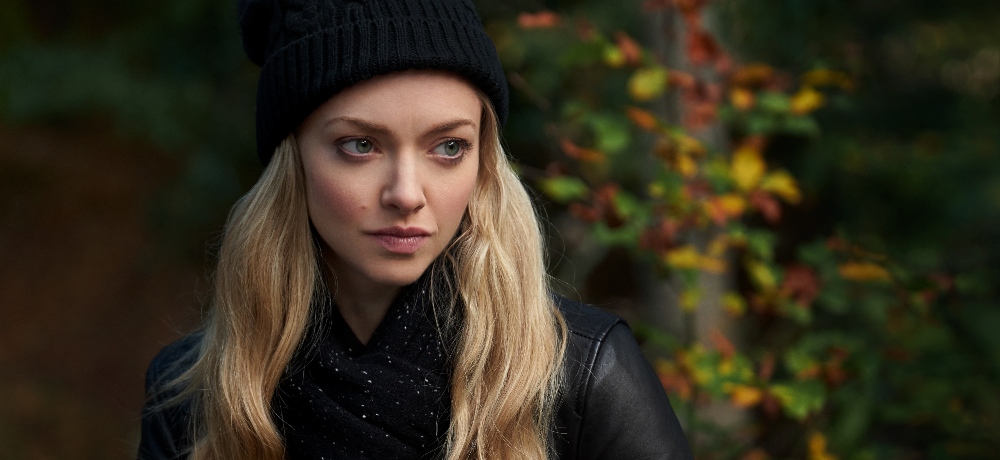


Amanda Seyfried as Susanna Conroy in You Should Have Left, written and directed by David Koepp.
Last week, Blumhouse’s latest, You Should Have Left, arrived on various digital and VOD platforms. Directed by David Koepp and co-starring Kevin Bacon and Amanda Seyfried, the story follows an embattled couple who decide to rent a remote Airbnb in Wales as a means to get their family back on track, but the home has far more sinister plans in mind for them.
Daily Dead recently had the opportunity to speak with Seyfried about the project, and she discussed what initially drew her to You Should Have Left and some of the similarities she shares with her character Susanna. Seyfried also chatted about collaborating with Koepp, the benefit of working with directors who are also writers, and more.
I'd love to hear a little bit about what was your initial response to this project and in particular, your character Susanna. I think this story has something definitely very interesting to say about how the industry views women and I think that also plays through with your relationship as well with Kevin's character.
Amanda Seyfried: You know, there are a lot of similarities between my character and me first and foremost. We're both actors, but it's also how I navigate through this world when I was a young actress. Basically, I'm a yes man and I would say yes to everything and my character just wants to be a people pleaser. You can see that she's created that vibe on set and she'll do anything, and make friends with everybody, but be easily taken advantage of.
And also, she's a mother and she is growing up in this industry and she's having questions about doing love scenes and being intimate and all that stuff. Things that are very, very in the forefront of my mind when I'm looking at a character in a script. So, that was obviously super interesting because I get to explore that on screen as much as I am in my life. It felt like it was really blending into my life. My assistant at the time actually played my PA in the movie, so that was just awesome and fun.
But that's where it stops. That's where the similarities stop. And that aspect of it was fun. The real challenge was exploring that marriage, that train wreck of a marriage that you know is just going nowhere fast, but you don't know how and you want to find out, hopefully if we did it well. That's the meat of it. That's why I wanted to do it.
What was it like working alongside David, in regards to bringing the complexities of your character to life?
Amanda Seyfried: Step-by-step, he just hears you. He is very present, really smart, whip-smart, honestly, I feel like so much in the movie, the three of us, Kevin and David and I, were just exploring in every facet of that marriage by asking questions and he just understood exactly what needed to be said and done in a particular way in order to help the story in terms of the thriller part, but also just to make sure we get the most humanity out of it and get it to be super, super truthful.
David just understands everything. He's like a therapist in some ways, and maybe that's why it felt so safe to work through that stuff with him. He's your best friend and your therapist and also someone who completely knows exactly what you're talking about. Yeah, he's quite a director. I just loved having discussions with him about marriage and parenting and stuff. It's so therapeutic to me in general to be around people that are so insightful and intuitive.
When you’re working with someone like David, or someone like Paul Schrader, who are directors who also write the material, what have you learned from working with these directors who are also fantastic writers?
Amanda Seyfried: They know the story better than anybody. When you have a director and the writer on set, they're definitely very tight and we definitely sometimes work in tandem, but it's like, you have everything you need in one person and there's just such a vast amount of information coming from someone and they're able to articulate what it is they're trying to say so well that you can't if you didn't write it. I mean, not to say that directors can't take what's written and create the world that they want to create, but [with] this, at least the intention behind the writing is directly being articulated to you at the director’s point of view. I also think they're so protective of it. There's really one way it can go and when I worked with Paul, he was very specific about what he wanted, very specific.
And I like that. I mean, some people don't like it, some actors want to have freedom, but God, put me in a box and design that box. I just want to do exactly what they want. Not to say that I don't have my own creative input sometimes, but I really want to give them what they want to be. Especially with both Paul and David.
Well, you worked with Diablo Cody as a writer, but she wasn't the director. How was that a different experience?
Amanda Seyfried: Well, they had also Karyn [Kusama], and Diablo spoke the same language as her, and Diablo trusted Karyn implicitly. I don't remember, It was a very long time ago, but I don't ever remember them having any disagreements about anything. Jennifer’s Body was just one of those rare experiences where it was like, Karyn just took off with it and made it a flawless movie, I think.
---------
Visit our online hub to catch up on our previous coverage of You Should Have Left!